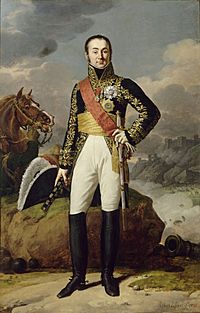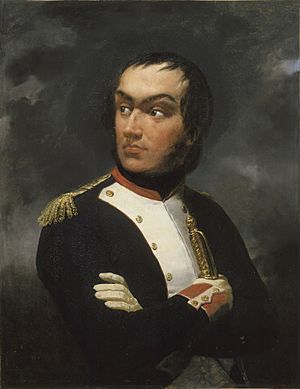Nicolas Oudinot facts for kids
Quick facts for kids
Marshal of the Empire
Nicolas Charles Oudinot
|
|
|---|---|

Oudinot by Robert Lefèvre, 1811
|
|
| Born | 25 April 1767 Bar-le-Duc, France |
| Died | 13 September 1847 (aged 80) Paris, France |
| Allegiance | |
| Service/ |
Army |
| Rank | Marshal of the Empire |
| Battles/wars | French Revolutionary Wars Napoleonic Wars |
| Awards | Grand Cross of the Legion of Honour |
| Other work | Governor of Les Invalides (1842–1847) |
Nicolas Charles Oudinot (born April 25, 1767, died September 13, 1847) was a famous French military leader. He became a Marshal of the Empire under Napoleon. Oudinot was incredibly brave and known for being wounded many times in battle. He was hit by cannonballs, swords, and at least twelve bullets during his long career! His name is even carved on the Arc de Triomphe in Paris.
Contents
Early Life and Career
Nicolas Charles Oudinot was born in Bar-le-Duc, France. His father was a brewer and farmer. Nicolas was the only one of his nine brothers and sisters to live to be an adult.
He wanted to be a soldier from a young age. He joined the army in 1784. However, because he wasn't from a noble family, he couldn't get promoted very high. He left the army in 1787 as a sergeant.
French Revolutionary Wars
The French Revolution changed everything for Oudinot. In 1792, when war broke out, he was chosen to be a lieutenant-colonel in the army. He quickly became known for his bravery.
He defended the fort of Bitsch very well in 1792. This got him noticed, and he joined the regular army. He fought bravely in many battles and was promoted to general in 1794. He was wounded several times and even captured once.
Oudinot worked closely with General André Masséna during the Swiss campaign in 1799. He was a general and then Masséna's chief of staff. He fought with great skill at the Second Battle of Zurich. He also showed great courage at the Siege of Genoa. Napoleon himself gave Oudinot a special sword of honor for his actions at the Battle of Monzambano.
Napoleonic Wars
Even though he was a great general, Oudinot was not made a Marshal when Napoleon first created them. However, he was given the Grand Cross of the Legion of Honour, a very important award.
In 1805, Oudinot led a famous group of soldiers called "grenadiers Oudinot." These were hand-picked, very strong troops. He led them to capture the bridges in Vienna. He was wounded again at the Battle of Schöngrabern.
He also fought well at the Battle of Ostrolenka in Poland in 1807. He showed great determination at the Battle of Friedland. In 1808, he became a Count of the French Empire.
After the Battle of Wagram in 1809, Oudinot was finally promoted to Marshal of France. He was also made a Duke.
From 1810 to 1812, Oudinot was in charge of the government in the former Kingdom of Holland. He then commanded a large group of soldiers in Napoleon's Russian campaign. His troops were very important in building a bridge over the Berezina river. This bridge helped many French soldiers escape after a big defeat. He was wounded again during this time.
Oudinot fought in the Battle of Lützen and the Battle of Bautzen. He was given command of troops to capture Berlin but was defeated at the Battle of Grossbeeren. Another Marshal, Marshal Ney, took over his command but was also defeated.
Despite these defeats, Oudinot remained important. He held key commands at the Battle of Leipzig and in the 1814 campaign. When Napoleon gave up his power, Oudinot supported the new king, Louis XVIII. Unlike some other generals, he did not rejoin Napoleon when he returned to power in 1815.
Later Life
Oudinot's last active military service was in 1823. He commanded troops during the French invasion of Spain and was governor of Madrid for a time. He later became the Governor of Les Invalides, a home for military veterans in Paris, where he died.
Honours
- 1849 : Knight Grand Cross in the Order of Pope Pius IX.
Personal Life
Nicolas Charles Oudinot was married twice and had several children.
He first married Charlotte Derlin in 1789. They had 7 children:
- Marie-Louise (1790–1832)
- Charles (1791–1863)
- Nicolette (1795–1865)
- Emilie (1796–1805)
- Auguste (1799–1835)
- Elise (1801–1882)
- Stephanie (1808–1893)
He married Eugenie de Coucy in 1812. They had 4 children:
- Louise-Marie (1816–1909)
- Caroline (1817–1896)
- Charles-Joseph (1819–1858)
- Henri (1822–1891)
See also
 In Spanish: Nicolas Charles Oudinot para niños
In Spanish: Nicolas Charles Oudinot para niños
- Charles Oudinot, the marshal's eldest son
 | Janet Taylor Pickett |
 | Synthia Saint James |
 | Howardena Pindell |
 | Faith Ringgold |


